The plant-based vitamin D3 supplements market is valued at USD 596.4 million in 2025 and is forecasted to reach USD 935.0 million by 2035, growing at a CAGR of 4.6%. Market growth is supported by increasing consumer preference for vegan and vegetarian nutrition, rising awareness of vitamin D deficiency, and wider adoption of plant-derived cholecalciferol sourced from algae and lichens. These supplements provide an alternative to lanolin-derived D3 while offering equivalent bioavailability, supporting their use across general wellness, bone health, and immune support applications.
Tablets represent the leading product segment due to their stability, long shelf life, and ease of dosage control. They are widely used across retail and online distribution channels and are preferred by manufacturers for cost-effective production and formulation flexibility. Advances in plant-derived extraction methods, allergen-free formulations, and clean-label ingredient profiles are influencing product development strategies in this category.
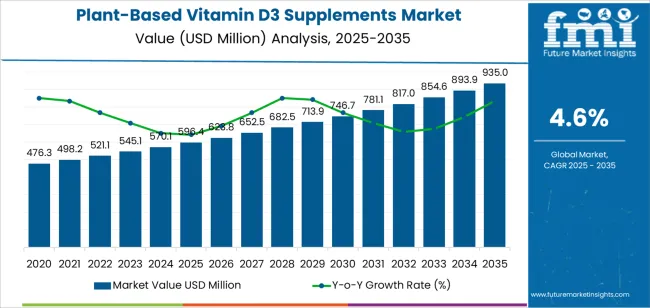
Asia Pacific leads global market expansion, driven by growing nutrition awareness and increased adoption of plant-based supplements in China, India, and Australia. Europe and North America maintain strong demand through established nutraceutical markets and sustained interest in vegan dietary products. Key companies include Vegetology, Cytoplan, Sweet Cures, Lamberts Healthcare, Healthspan, Solgar, and DR.VEGAN, focusing on formulation quality, plant-based sourcing, and evidence-supported nutrient delivery.
The acceleration and deceleration pattern shows an initial period of firm growth followed by a gradual shift toward steadier demand. Between 2025 and 2029, the market will move through an acceleration phase driven by increased consumer preference for vegan and allergen-free supplements. Expansion of plant-derived D3 sourced from lichen, along with wider distribution through e-commerce and specialty nutrition channels, will support early momentum. Regulatory clarity for plant-based fortification in major regions will further reinforce short-term growth.
From 2030 to 2035, the market will enter a mild deceleration phase as adoption becomes more uniform across established dietary-supplement categories. Growth will rely on replacement purchases, incremental formulation improvements, and broader inclusion of plant-based D3 in multivitamins, functional foods, and fortified beverages. While discretionary spending patterns may create minor fluctuations, consistent demand for vegan alternatives and clean-label ingredients will support stable expansion. The overall pattern reflects a market transitioning from early lifestyle-driven acceleration to a mature stage shaped by product standardization, recurring use, and continued interest in plant-sourced micronutrient supplementation.
| Metric | Value |
|---|---|
| Market Value (2025) | USD 596.4 million |
| Market Forecast Value (2035) | USD 935.0 million |
| Forecast CAGR (2025 to 2035) | 4.6% |
The plant based vitamin D3 supplements market is growing as consumers shift toward vegan and vegetarian diets and seek nutrient sources that do not rely on animal ingredients. Plant derived D3, typically obtained from lichen or algae, appeals to users who prioritise ethical, ecofriendly and clean label supplements. Rising awareness of vitamin D deficiency across all age groups also supports higher supplement intake for bone health, immunity and general wellness.
Improvements in extraction methods and formulation allow manufacturers to offer high potency capsules, oils, gummies and fortified foods that meet varied consumer preferences. Online retail and subscription services increase availability and encourage routine use. Growth is further supported by wider adoption of plant based nutrition in fitness, sports and lifestyle markets. Constraints include higher production costs for plant sourced D3, limited global suppliers for raw material and varying regulatory requirements across regions that influence product claims and distribution.
The plant-based vitamin d3 supplements market is segmented by product type and application. By product type, the market includes liquid preparations, tablet forms, and others. Based on application, it is categorized into online sales and offline sales channels. Regionally, the market is divided into Asia Pacific, Europe, North America, and other key regions.
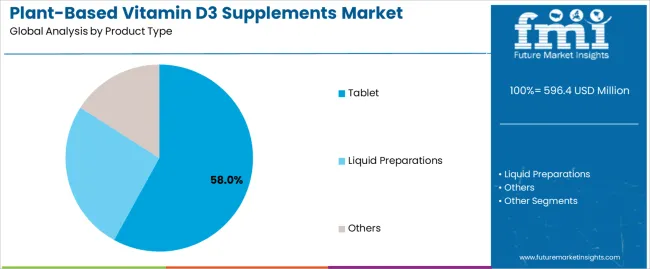
The tablet segment represents the leading category in the plant-based vitamin D3 supplements market, accounting for an estimated 58.0% of total market share in 2025. Tablets are widely adopted due to their longer shelf life, dosing consistency, and compatibility with established supplement distribution channels. They remain the dominant format for daily nutritional supplementation and are favored by consumers seeking standardized intake and cost-efficient options.
The liquid preparations segment follows with an estimated 32.0% share. Liquid formulations support flexible dosing, faster absorption, and suitability for children and elderly users who prefer non-tablet forms. The others category, including gummies, sprays, and powder sachets, accounts for about 10.0%, driven by niche demand for convenience-oriented formats.
Key factors supporting the tablet segment include:
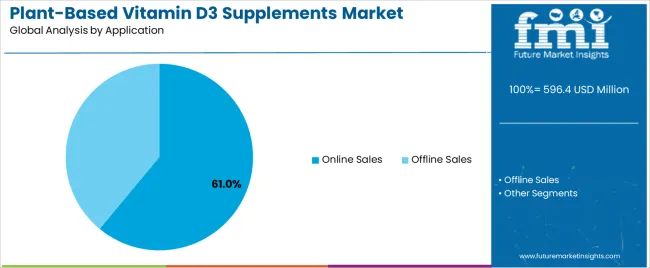
The online sales segment accounts for approximately 61.0% of the plant-based vitamin D3 supplements market in 2025. E-commerce growth, combined with increasing consumer preference for home delivery of nutritional products, has accelerated online supplement purchases. Digital platforms offer product variety, transparent ingredient information, and subscription-based replenishment services.
The offline sales segment, representing about 39.0%, includes pharmacies, health stores, supermarkets, and specialty nutrition retailers. Offline distribution remains important for consumers who prefer in-person consultation or immediate product availability.
Primary dynamics driving demand from the online sales segment include:
Growing interest in vegan nutrition, rising awareness of Vitamin D deficiency, and increased preference for sustainably sourced ingredients are driving market growth.
The Plant-Based Vitamin D3 Supplements Market is expanding as consumers shift toward vegetarian and vegan lifestyles and seek alternatives to traditional lanolin-derived Vitamin D3. Rising global awareness of Vitamin D deficiency, especially in regions with limited sunlight exposure, strengthens demand for daily supplementation. Plant-based D3 derived from lichens and algae appeals to consumers who prioritise clean-label, allergen-free, and ethically sourced ingredients. The expansion of e-commerce and direct-to-consumer health brands allows plant-based supplements to reach wider demographics, including individuals seeking immune-support formulations, bone-health blends, and holistic wellness products. Manufacturers are improving product stability, potency, and bioavailability, making plant-derived D3 formulations competitive with established animal-based variants.
Higher production cost, limited raw material supply, and variability in product potency are restraining adoption.
Plant-based Vitamin D3 generally costs more to produce than conventional D3 due to constrained raw material availability and specialised extraction processes. These cost differentials can limit adoption in price-sensitive markets or among large-scale supplement formulators. Supply chain limitations for lichen and algae sources can create inconsistency in availability, which affects production planning and pricing stability. Potency variations across plant-based inputs require stringent testing and standardisation, increasing regulatory and quality-control burdens. Some consumers also remain unaware of the functional differences between plant-based and traditional D3, limiting immediate transition across mainstream retail channels.
Expansion of fortified plant-based foods, integration of D3 into multi-nutrient complexes, and rising adoption in emerging wellness markets are shaping industry trends.
Manufacturers are incorporating plant-derived D3 into fortified beverages, dairy alternatives, cereals, and functional snacks to meet consumer demand for convenient nutrient intake. Multi-nutrient complexes combining plant-based D3 with calcium, magnesium, K2, and omega-rich oils are gaining traction across wellness and bone-health categories. Growth in Asia Pacific, Latin America, and the Middle East reflects increasing awareness of nutritional deficiencies and improved access to premium supplements through digital retail platforms. Advances in algae cultivation, extraction research, and ingredient stabilisation are expected to broaden supply availability and support long-term market expansion.
The global plant-based Vitamin D3 supplements market is expanding through 2035, supported by increased adoption of vegan nutrition, rising interest in non-animal vitamin sources, and broader demand for clean-label products. China leads with a 6.2% CAGR, followed by India at 5.8%, reflecting strong consumption of plant-derived nutrition and expanding supplement retail channels. Germany grows at 5.3%, supported by regulated product standards and rising preference for algae-derived ingredients. Brazil records 4.8%, driven by increasing awareness of plant-based micronutrients. The United States grows at 4.4%, while the United Kingdom (3.9%) and Japan (3.5%) sustain stable demand through established nutraceutical markets and consistent clean-label trends.
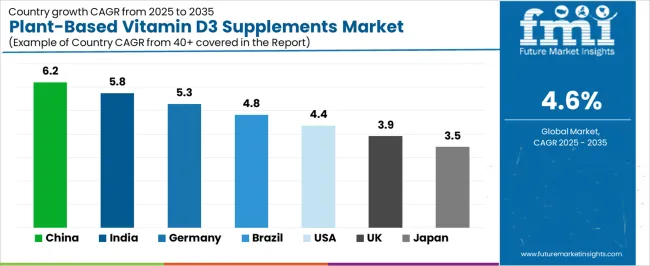
| Country | CAGR (%) |
|---|---|
| China | 6.2 |
| India | 5.8 |
| Germany | 5.3 |
| Brazil | 4.8 |
| USA | 4.4 |
| UK | 3.9 |
| Japan | 3.5 |
China’s market grows at 6.2% CAGR, supported by rising interest in plant-based nutrition, increasing vitamin-deficiency awareness, and expanding availability of algae-derived Vitamin D3 formulations. Manufacturers offer capsules, gummies, and liquid drops tailored to adult and senior consumers seeking non-animal products. Domestic supplement brands integrate plant-based D3 into multivitamin blends and immunity-support formulations. Growth in e-commerce and pharmacy channels strengthens distribution across major cities and secondary regions. Broader adoption of plant-based diets and increased preventive-health spending reinforce long-term demand for non-synthetic, non-animal vitamin sources.
Key Market Factors:
India’s market grows at 5.8% CAGR, driven by rising health-supplement use, increased vitamin-deficiency prevalence, and stronger demand for vegan formulations. Plant-based Vitamin D3 products made from lichen or algae gain traction among adults adopting clean-label options. Domestic nutraceutical companies launch capsules, sachets, and chewable formats suited for daily supplementation. Growth in online platforms and organized pharmacy chains expands accessibility across metro and Tier-2 cities. Preventive-health awareness and lifestyle-related deficiency concerns support ongoing adoption of plant-derived Vitamin D3 within general wellness routines.
Market Development Factors:
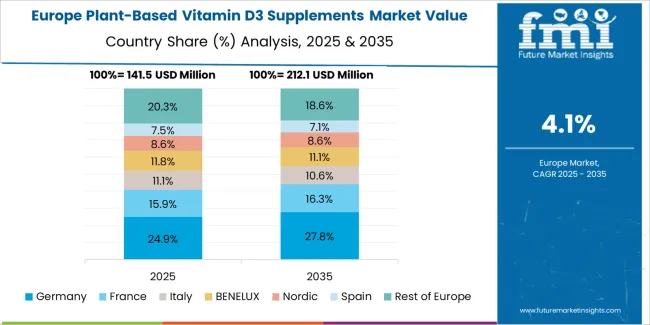
Germany’s market grows at 5.3% CAGR, supported by established dietary-supplement regulations, rising preference for plant-sourced micronutrients, and broad adoption of algae-derived Vitamin D3 within vegan product portfolios. Consumers favor formulations featuring verified purity, documented sourcing, and compliance with European ingredient guidelines. Retailers and health stores supply capsules, sprays, and fortified foods containing plant-derived D3. Increased focus on clean-label composition and allergen-free ingredients strengthens demand. Use across adult wellness, senior health, and fortified nutrition categories supports stable market expansion.
Key Market Characteristics:
Brazil’s market grows at 4.8% CAGR, driven by increasing interest in plant-based diets, rising nutritional-supplement usage, and growing awareness of Vitamin D deficiency. Consumers adopt plant-based D3 supplements as part of broader wellness routines, including immune support and daily nutritional balance. Retailers distribute algae-derived and lichen-derived D3 products across pharmacies and online marketplaces. Growth in urban health-conscious households strengthens demand for clean-label formulations. Domestic nutraceutical firms expand offerings aligned with vegan and natural-ingredient preferences.
Market Development Factors:
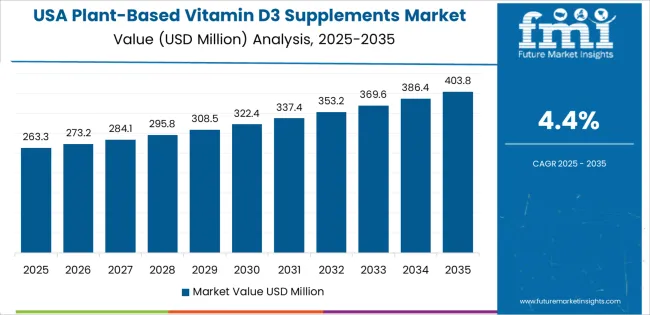
The United States grows at 4.4% CAGR, supported by established nutraceutical consumption, rising adoption of plant-based diets, and increased availability of algae-derived D3 within clean-label supplement portfolios. Health-focused consumers seek plant-based alternatives to traditional lanolin-derived D3. Manufacturers offer gummies, capsules, and liquid formulations positioned for general wellness, bone health, and immune support. Retailers and online marketplaces distribute vegan-certified products across premium and mainstream categories. Integration of plant-based D3 in functional foods and multivitamin blends supports ongoing adoption.
Key Market Factors:
The United Kingdom’s market grows at 3.9% CAGR, supported by steady demand for clean-label supplements, expansion of vegan nutritional products, and increased use of algae-derived D3 in wellness routines. Retailers offer capsules, chewables, and sprays tailored to adult consumers seeking plant-based alternatives. Health stores and online platforms supply certified vegan D3 formulations aligned with national supplement-use guidelines. Broader awareness of vitamin-deficiency risks during winter months supports consistent seasonal demand.
Market Development Factors:
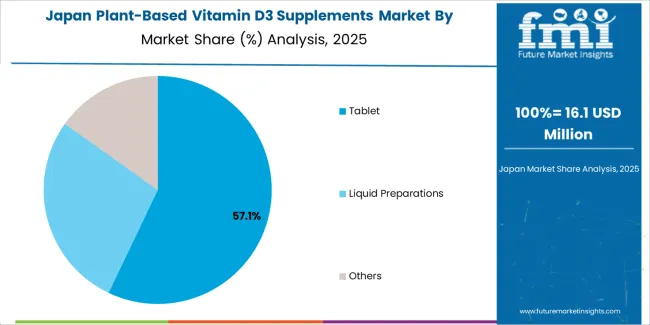
Japan’s market grows at 3.5% CAGR, supported by consistent nutraceutical consumption, interest in plant-based wellness products, and adoption of clean-label supplements among adult consumers. Algae-derived D3 formulations are used in capsules, chewable formats, and fortified health foods. Domestic brands emphasize purity, dosage stability, and compact packaging suited for daily use. Growth in e-commerce and specialty health stores strengthens access to vegan nutritional products. Increased preventive-health focus among older adults supports continued uptake of plant-derived D3 supplements.
Key Market Characteristics:
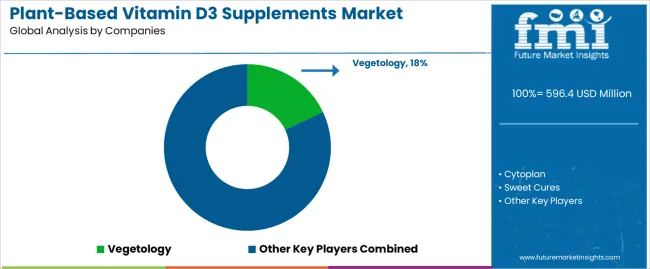
The plant-based vitamin D3 supplements market is moderately fragmented, with about a dozen manufacturers supplying algae-derived D3 for nutritional, vegan, and fortified health products. Vegetology leads the market with an estimated 18.0% global share, supported by its early adoption of algae-sourced D3 and consistent product quality verified through established supplement channels. Its leadership is reinforced by controlled raw material sourcing and reliable formulation standards for capsules, sprays, and blended nutritional products.
Cytoplan, Sweet Cures, and Lamberts Healthcare follow as strong competitors, offering plant-based D3 in formulations suited to daily supplementation and dietary programmes. Their positions rely on documented ingredient quality, batch consistency, and established presence in the UK and European health markets. Healthspan, Solgar, and DR.VEGAN maintain balanced portfolios that integrate plant-sourced D3 within broader vitamin and mineral product lines.
International suppliers including Biogen, Life Extension, Inlife Pharma, and Land Art contribute to market growth through regionally adapted formulations and diverse delivery formats such as liquids, tablets, and soft gels. Nordic supports niche demand for plant-derived D3 in clean-label products aligned with Scandinavian nutrition preferences.
Competition in this market centers on ingredient purity, certification transparency, and formulation stability. Growth is driven by rising demand for vegan-compatible supplements and wider consumer interest in algae-derived nutrients that support consistent serum D3 levels without reliance on animal sources.
| Items | Values |
|---|---|
| Quantitative Units | USD million |
| Product Type | Liquid Preparations, Tablet, Others |
| Application | Online Sales, Offline Sales |
| Regions Covered | Asia Pacific, Europe, North America, Latin America, Middle East & Africa |
| Countries Covered | India, China, USA, Germany, South Korea, Japan, Italy, and 40+ countries |
| Key Companies Profiled | Vegetology, Cytoplan, Sweet Cures, Lamberts Healthcare, Healthspan, Solgar, DR.VEGAN, Biogen, Life Extension, Inlife Pharma, Land Art, Nordic |
| Additional Attributes | Dollar sales by product type and application categories; regional adoption trends across Asia Pacific, Europe, and North America; competitive landscape of plant-based nutraceutical and vitamin supplement brands; advancements in vegan-certified D3 formulations sourced from lichen; integration with e-commerce health retail, nutrition programs, and ecofriendly supplement manufacturing. |
The global plant-based vitamin d3 supplements market is estimated to be valued at USD 596.4 million in 2025.
The market size for the plant-based vitamin d3 supplements market is projected to reach USD 935.0 million by 2035.
The plant-based vitamin d3 supplements market is expected to grow at a 4.6% CAGR between 2025 and 2035.
The key product types in plant-based vitamin d3 supplements market are tablet, liquid preparations and others.
In terms of application, online sales segment to command 61.0% share in the plant-based vitamin d3 supplements market in 2025.






Our Research Products

The "Full Research Suite" delivers actionable market intel, deep dives on markets or technologies, so clients act faster, cut risk, and unlock growth.

The Leaderboard benchmarks and ranks top vendors, classifying them as Established Leaders, Leading Challengers, or Disruptors & Challengers.

Locates where complements amplify value and substitutes erode it, forecasting net impact by horizon

We deliver granular, decision-grade intel: market sizing, 5-year forecasts, pricing, adoption, usage, revenue, and operational KPIs—plus competitor tracking, regulation, and value chains—across 60 countries broadly.

Spot the shifts before they hit your P&L. We track inflection points, adoption curves, pricing moves, and ecosystem plays to show where demand is heading, why it is changing, and what to do next across high-growth markets and disruptive tech

Real-time reads of user behavior. We track shifting priorities, perceptions of today’s and next-gen services, and provider experience, then pace how fast tech moves from trial to adoption, blending buyer, consumer, and channel inputs with social signals (#WhySwitch, #UX).

Partner with our analyst team to build a custom report designed around your business priorities. From analysing market trends to assessing competitors or crafting bespoke datasets, we tailor insights to your needs.
Supplier Intelligence
Discovery & Profiling
Capacity & Footprint
Performance & Risk
Compliance & Governance
Commercial Readiness
Who Supplies Whom
Scorecards & Shortlists
Playbooks & Docs
Category Intelligence
Definition & Scope
Demand & Use Cases
Cost Drivers
Market Structure
Supply Chain Map
Trade & Policy
Operating Norms
Deliverables
Buyer Intelligence
Account Basics
Spend & Scope
Procurement Model
Vendor Requirements
Terms & Policies
Entry Strategy
Pain Points & Triggers
Outputs
Pricing Analysis
Benchmarks
Trends
Should-Cost
Indexation
Landed Cost
Commercial Terms
Deliverables
Brand Analysis
Positioning & Value Prop
Share & Presence
Customer Evidence
Go-to-Market
Digital & Reputation
Compliance & Trust
KPIs & Gaps
Outputs
Full Research Suite comprises of:
Market outlook & trends analysis
Interviews & case studies
Strategic recommendations
Vendor profiles & capabilities analysis
5-year forecasts
8 regions and 60+ country-level data splits
Market segment data splits
12 months of continuous data updates
DELIVERED AS:
PDF EXCEL ONLINE
Plant-based Iron Supplements Market Growth - Functional Nutrition & Demand 2025 to 2035
Vitamin B12 Ingredient Market Size and Share Forecast Outlook 2025 to 2035
Vitamin C Ingredients Market Size and Share Forecast Outlook 2025 to 2035
Vitamin Biomarkers Market Size and Share Forecast Outlook 2025 to 2035
Vitamin E Antioxidant Creams Market Analysis - Size, Share, and Forecast Outlook 2025 to 2035
Vitamin C Serums (Ascorbic Acid) Market Analysis - Size and Share Forecast Outlook 2025 to 2035
Vitamin Tonics Market Size and Share Forecast Outlook 2025 to 2035
Vitamin A Market Size and Share Forecast Outlook 2025 to 2035
Vitamin Ingredients Market Size and Share Forecast Outlook 2025 to 2035
Vitamin Premix Market Analysis - Size, Growth, and Forecast 2025 to 2035
Vitamin Patches Market - Size, Share, and Forecast Outlook 2025 to 2035
Vitamin Gummies Market Analysis - Size, Share, and Forecast Outlook 2025 to 2035
Vitamin D Ingredients Market Size, Growth, and Forecast for 2025 to 2035
Vitamin Yeast Market Analysis by Vitamin Composition, Application, Product Claim andOther Types Through 2035
Vitamin Supplement Market Insights - Wellness & Industry Growth 2025 to 2035
Vitamin D Testing Market Analysis by Component, Type, and Region: Forecast for 2025 to 2035
Vitamin and Mineral Supplement Market Insights - Trends & Forecast 2025 to 2035
Vitamin B Test Market Insights - Size, Trends & Forecast 2025 to 2035
Vitamin and Mineral Market – Growth, Innovations & Health Trends
Vitamin Shot Market – Growth, Demand & Functional Benefits

Thank you!
You will receive an email from our Business Development Manager. Please be sure to check your SPAM/JUNK folder too.
Chat With
MaRIA